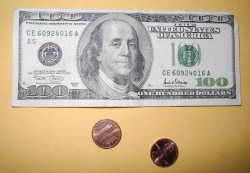Difference between revisions of "Portal:Economic Freedom"
| Line 8: | Line 8: | ||
<br>Wealth and poverty can be thought of as two sides of the same coin. If you understand wealth, you begin to understand poverty and vice-versa. So, what is wealth? CW presents its understanding and it is that which we speak of here. | <br>Wealth and poverty can be thought of as two sides of the same coin. If you understand wealth, you begin to understand poverty and vice-versa. So, what is wealth? CW presents its understanding and it is that which we speak of here. | ||
<br>It will be helpful to first say what it isn't. | <br>It will be helpful to first say what it isn't. | ||
| − | :It is | + | |
| + | :It is easy to confound wealth and money. They are not the same. A large pile of gold coins makes you rich, but not necessarily wealthy. Gold is a static asset. You can use it to buy things, but it creates nothing unless it is used to enable assets that do produce wealth. Once spent for consumption, nothing is left behind to generate a continuing stream of spending power. | ||
George Gilder<ref name="Wealth and Poverty">Gilder, George. ''Wealth and Poverty''. New York. Basic Books, Inc. 1981</ref> uses the illustration of oil rich countries. Several countries with the highest per-capita spending power are in the middle east. Their spending power comes from their oil assets. They can buy Rolls Royces, private Boeings, and build office buildings. But those are perishable things which, in themselves, generate no further income unless they are put to use in wealth generating ways. When the oil is gone, those countries could become as poor as they were before the oil was discovered. They have more riches than wealth. Venezuela has much the same problem today, but is further down the road. They are a formerly rich country of little wealth, now in the process of going broke. | George Gilder<ref name="Wealth and Poverty">Gilder, George. ''Wealth and Poverty''. New York. Basic Books, Inc. 1981</ref> uses the illustration of oil rich countries. Several countries with the highest per-capita spending power are in the middle east. Their spending power comes from their oil assets. They can buy Rolls Royces, private Boeings, and build office buildings. But those are perishable things which, in themselves, generate no further income unless they are put to use in wealth generating ways. When the oil is gone, those countries could become as poor as they were before the oil was discovered. They have more riches than wealth. Venezuela has much the same problem today, but is further down the road. They are a formerly rich country of little wealth, now in the process of going broke. | ||
Revision as of 22:44, 24 July 2014
Wealth and Poverty in America
|
One way to understand American success is to look at wealth and poverty in the U.S. Americans have enormous wealth and some poverty as well. Both are the result of the human condition, American society, our government as constructed by the constitution, and government policy quite apart from the constitution. Both wealth and poverty are badly misunderstood, which is a problem for honest politics. To understand them is to strengthen our basis for making intelligent political decisions and dispersing the fog of political marketing.
George Gilder[1] uses the illustration of oil rich countries. Several countries with the highest per-capita spending power are in the middle east. Their spending power comes from their oil assets. They can buy Rolls Royces, private Boeings, and build office buildings. But those are perishable things which, in themselves, generate no further income unless they are put to use in wealth generating ways. When the oil is gone, those countries could become as poor as they were before the oil was discovered. They have more riches than wealth. Venezuela has much the same problem today, but is further down the road. They are a formerly rich country of little wealth, now in the process of going broke.
This category is the place to insert articles about wealth, poverty, economics, and economic freedom in general and how they have been effected by U.S. government policy and social customs and mores.
|
 |
CategoriesClick on arrows to see subcategories and articles. Category America's Wealth not found
Things you can doHere are some things you can do:
|
TBD
|